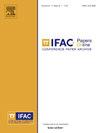Insight-driven Optimization to Improve Dynamic Scheduling for Flexible Job-shops
Q3 Engineering
引用次数: 0
Abstract
Planning and scheduling problems can be challenging to manage, and the related optimization problem is often too complex to solve in real-time. The typical approach to address this issue is to apply heuristic policies, which perform reasonably well. Machine learning algorithms can be used to replace heuristics, but this raises the issue of obtaining unexplainable solutions. The application of reinforcement learning with policy extraction technique can help produce explainable results to improve the dynamic system of the planning and scheduling problem. As a case study, we use the simulation model of a dynamic flexible job shop to learn a solution strategy for the associated scheduling problem with deep reinforcement learning. Based on this, we were able to extract a decision tree that is superior to classical dispatching heuristics for a wide variety of scenarios. It also provides valuable information about the criteria for decision-making. Here we offer a new approach to analyzing and solving these problems - leading to an improvement in dynamic systems.
改进灵活作业车间动态调度的洞察驱动优化
计划和调度问题可能很难管理,而相关的优化问题往往过于复杂,无法实时解决。解决这个问题的典型方法是应用启发式策略,它执行得相当好。机器学习算法可以用来取代启发式算法,但这引发了获得无法解释的解决方案的问题。将强化学习与策略抽取技术相结合,可以产生可解释的结果,从而改善规划调度问题的动态系统。作为案例研究,我们使用动态柔性作业车间的仿真模型来学习深度强化学习的相关调度问题的解决策略。在此基础上,我们能够在各种场景中提取优于经典调度启发式的决策树。它还提供了有关决策标准的宝贵信息。在此,我们提供了一种分析和解决这些问题的新方法——导致动态系统的改进。
本文章由计算机程序翻译,如有差异,请以英文原文为准。
求助全文
约1分钟内获得全文
求助全文
来源期刊

IFAC-PapersOnLine
Engineering-Control and Systems Engineering
CiteScore
1.70
自引率
0.00%
发文量
1122
期刊介绍:
All papers from IFAC meetings are published, in partnership with Elsevier, the IFAC Publisher, in theIFAC-PapersOnLine proceedings series hosted at the ScienceDirect web service. This series includes papers previously published in the IFAC website.The main features of the IFAC-PapersOnLine series are: -Online archive including papers from IFAC Symposia, Congresses, Conferences, and most Workshops. -All papers accepted at the meeting are published in PDF format - searchable and citable. -All papers published on the web site can be cited using the IFAC PapersOnLine ISSN and the individual paper DOI (Digital Object Identifier). The site is Open Access in nature - no charge is made to individuals for reading or downloading. Copyright of all papers belongs to IFAC and must be referenced if derivative journal papers are produced from the conference papers. All papers published in IFAC-PapersOnLine have undergone a peer review selection process according to the IFAC rules.
 求助内容:
求助内容: 应助结果提醒方式:
应助结果提醒方式:


